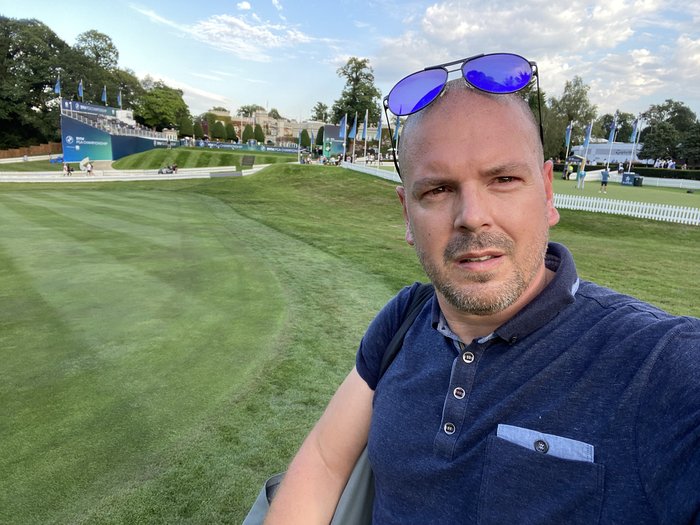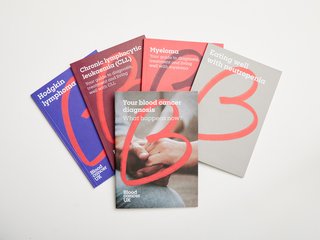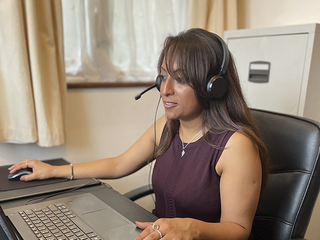The ups and downs of living with PV
Alex was diagnosed with polycythaemia vera (PV) in 2019. He talks about his diagnosis, treatment with venesection (blood-letting) and what it’s like living with PV.

For information see our web pages about PV or order our new PV booklet.
I first went to the doctor in April 2019. I had back pain but my GP didn’t think it was a back problem and ordered some blood tests. The results looked a bit unusual, so they sent me off for an ultrasound and an MRI.
When I saw a haematologist, it was on a cancer ward. The haematologist was quite blasé really,
He told me I had PV and then he handed me a Macmillan nurse’s business card and said, 'This will be the nurse that's looking after you.' A cancer nurse.
Being told you have blood cancer
When anyone says the word cancer, you instantly think, “How long have I got to live? When am I going to start getting really ill?” My wife Amy was with me and we were both stunned.
We tried to research as much as we could about what PV was and the side effects and the long-term future. We learned that it can lead to leukaemia and for a while we were constantly focused on the worst case scenario.
In fact, the main risk with PV is that it makes your blood too thick. That can cause a stroke or a heart attack. But once you know about it, it can be monitored and treated.
Up to that point, I probably could have been a bit healthier. I did smoke a bit. It sounds a bit strange but I feel like it saved my life really, being diagnosed with this. Because if I hadn't gone to the doctors I might not even be here now. And because I understand it’s serious, it’s encouraging me to live more healthily.

Order your free guide to PV
Includes understanding PV, treatments and how to look after yourself
My treatment with venesection
I take aspirin to thin my blood. And I regularly have a procedure called venesection. That’s where they draw blood out to keep my red blood cell count down. It’s similar to when you donate blood, but they take a bit more.
At first, I had venesection every four weeks but now I only need it every six weeks. I have blood tests beforehand, and then on the day I go to the cancer treatment ward at the hospital, and I sit back in a chair with my arm on a pillow and my palm facing up. They clean the inside of my elbow with an alcohol wipe, and they put a strap round my bicep. Then they push in the needle and the blood goes into a bag hanging nearby. I’ve got veins that are easy to find so that’s lucky. I always have it done in the same arm, my left. It’s what I’m used to.
There are some things I’ve learnt from experience:
- Don’t watch the needle go in.
- Make sure you eat properly beforehand.
- Make sure you drink lots of water.
I made the mistake around the third or fourth time of thinking it was easy. I hadn’t eaten or drunk enough and I watched as the needle went in. On top of that, the nurse for some reason hung the bag that collects the blood off my finger. I got the sweats and felt sick. Now I follow my own rules and it hasn’t happened again!
The process only takes 15 to 20 minutes. They stick a bit of gauze over the wound, take my blood pressure and give me a biscuit before I go on my way.
The mental side of having PV
I think generally, I'm quite a positive person but it did take a while to get my head around it all. I think I was in shock. Initially, I took the day off when I had a venesection because it was too much for my brain to cope with doing that and then going back to work.
The first few times I was really emotional and overwhelmed. But it was the environment that brought that out, not the procedure.
At my hospital, venesection takes place on a cancer ward. So when I go, I see people who don’t have any hair because they’re having chemotherapy and I see kids there, which is heartbreaking. And it reminds me that I have cancer, although I feel like a bit of a fraud sometimes because all I do is sit there and chat to the nurses while I have some blood drained out.
But over time, it’s become normalised. It's just life now.
I think in many ways PV is a mental thing more than anything else. You worry about what it leads to and you can’t predict how it will go, so there’s always an underlying anxiety I suppose. I was offered some counselling but the waiting time was so long I gave up. Just watching some comedy puts me in a better mood!

Worried about anything or have questions?
If you need someone to talk to, please don't hesitate to contact our Support Service by phone or email.
Living with PV
I'm aware of some side effects of PV. I bruise quite easily. But my haematologist says that might just be because I take aspirin.
I know when it’s time for more treatment. I get headaches and the night sweats get worse. I have a fan on all night to help with that. I also get itchy skin, but it’s not severe.
I've always been active from a sport point of view, but I didn’t have the healthiest sort of lifestyle. Now, I try and keep myself as fit as I can because that I know it helps with the symptoms.
Basically, I take half an hour out of my life every six weeks to have some treatment done. So having PV doesn’t affect my life too much.
I think it’s good that the problem has been picked up while I’m relatively young, before any major damage was done. And because I’m monitored regularly, anything out of the norm will be picked up quite quickly. I find that reassuring and I hope other people with PV do too.
